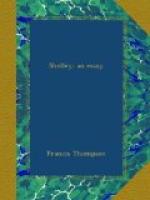* * * * *
Coming to Shelley’s poetry, we peep over the wild mask of revolutionary metaphysics, and we see the winsome face of the child. Perhaps none of his poems is more purely and typically Shelleian than The Cloud, and it is interesting to note how essentially it springs from the faculty of make-believe. The same thing is conspicuous, though less purely conspicuous, throughout his singing; it is the child’s faculty of make-believe raised to the nth power. He is still at play, save only that his play is such as manhood stops to watch, and his playthings are those which the gods give their children. The universe is his box of toys. He dabbles his fingers in the day-fall. He is gold-dusty with tumbling amidst the stars. He makes bright mischief with the moon. The meteors nuzzle their noses in his hand. He teases into growling the kennelled thunder, and laughs at the shaking of its fiery chain. He dances in and out of the gates of heaven: its floor is littered with his broken fancies. He runs wild over the fields of ether. He chases the rolling world. He gets between the feet of the horses of the sun. He stands in the lap of patient Nature and twines her loosened tresses after a hundred wilful fashions, to see how she will look nicest in his song.
This it was which, in spite of his essentially modern character as a singer, qualified Shelley to be the poet of Prometheus Unbound, for it made him, in the truest sense of the word, a mythological poet. This child-like quality assimilated him to the child-like peoples among whom mythologies have their rise. Those Nature myths which, according to many, are the basis of all mythology, are likewise the very basis of Shelley’s poetry. The lark that is the gossip of heaven, the winds that pluck the grey from the beards of the billows, the clouds that are snorted from the sea’s broad nostril, all the elemental spirits of Nature, take from his verse perpetual incarnation and reincarnation, pass in a thousand glorious transmigrations through the radiant forms of his imagery.
Thus, but not in the Wordsworthian sense, he is a veritable poet of Nature. For with Nature the Wordsworthians will admit no tampering: they exact the direct interpretative reproduction of her; that the poet should follow her as a mistress, not use her as a handmaid. To such following of Nature, Shelley felt no call. He saw in her not a picture set for his copying, but a palette set for his brush; not a habitation prepared for his inhabiting, but a Coliseum whence he might quarry stones for his own palaces. Even in his descriptive passages the dream-character of his scenery is notorious; it is not the clear, recognisable scenery of Wordsworth, but a landscape that hovers athwart the heat and haze arising from his crackling fantasies. The materials for such visionary Edens have evidently been accumulated from direct experience, but they are recomposed by




